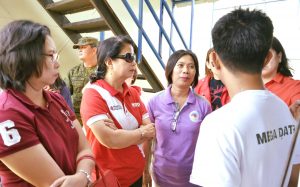
Department of Social Welfare and Development (DSWD) Secretary Virginia N. Orogo recently visited the Mega Drug Abuse Treatment Rehabilitation Center (DATRC) at Fort Magsaysay in Nueva Ecija to explore a possible partnership for drug rehabilitation efforts.
The Mega DATRC is one of the key projects of the administration in its continued effort to eliminate illegal drugs in the country and provide its citizens with drug-free communities. The 100,000 square-meter facility, which boasts a 10,000-bed capacity, caters to drug dependents who seek in-patient treatment.
Sec. Orogo conducted an ocular inspection of the facility together with DSWD-Field Office III Regional Director Gemma Gabuya and met with Mega DATRC’s Commanding Officer Col. Nelson J. Dancel to discuss how the Department could partner with the center in its drug rehabilitation program.
During the meeting, the administration of the DATRC presented to the Secretary its rehabilitation program for both adults and children in conflict with the law (CICL), starting from the admission of the residents to their aftercare.
A child in conflict with the law or CICL refers to a child who is alleged as, accused of, or adjudged as, having committed an offense under Philippine laws.
During her visit, Sec. Orogo interviewed CICLs who are undergoing treatment in the facility. She said the DSWD wanted to ensure the welfare of the residents of the center, specifically, those who are minors.
CICLs admitted in the mega rehab center undergo a minimum of six months to one year of a specialized rehabilitation program. Under which, the children will be provided with spiritual development, values formation, learning sessions, and other services.
For the rehabilitation to be effective, Sec. Orogo underscored the importance of involving the families of the residents of the facility in the rehabilitation process, especially during the aftercare phase.
“The involvement of the family is an essential part of the success of every rehabilitation process. Families can help prevent relapse and further the development of a drug dependent,” the Secretary explained.
“We at the DSWD continue to support recovering drug dependents who want to turn their lives around and start anew. We have various interventions to help them fully recover and become productive members of our society again. We also continue to explore various partnerships to provide them with more and better services that could help them in their road towards recovery,” she said.
DSWD services for CICLs
The DSWD maintains 16 facilities for children in conflict with the law, 15 of which are known as the Regional Rehabilitation Center for Youth (RRCY), including the MIMAROPA Youth Center and the National Training School for Boys.
These facilities provide care and rehabilitation services to CICL aged above 15 and below 18 years old, who are ordered by the court to undergo rehabilitation at the Department’s facility. Services provided in the centers include home life services, which provides a home environment and group living arrangement with well-balanced, organized, and non-formal activities for the youth; and treatment interventions, including counseling services, milieu therapy, behavioral modification, and therapeutic community.
RRCYs also provide support services to the children, including competency and life skills development, vocational training livelihood and productivity, socio-cultural and recreational, and spiritual enhancement programs. The facilities also provide leadership and skills, and medical and dental services training.###


